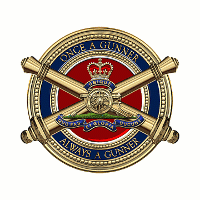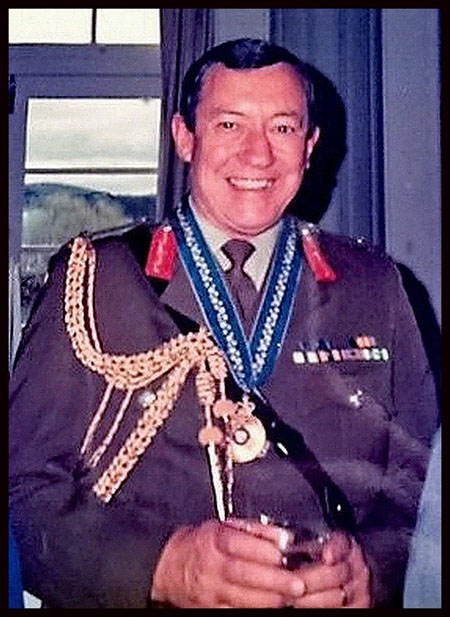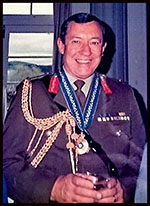Lieutenant Fitzgerald graduated from RMC on 12 December 1956. He joined the Royal Australian Artillery with fellow Gunner classmates Jock Jenvey, Norm Thomson, Jim Macfarlane, Don Quinn, Garth Hughes, Cliff Dodds, Ron Morris, Nick Marshall, John Gates and John Gatley (NZ). Following a Young Officers’ Course, Gordon was posted to the 16th National Service Training Service Battalion at Woodside, SA. It was here he met the love of his life, Noelene Josephson, a secretary in the Army. They were married in 1959 prior to his next posting to 1st Field Regiment RAA at Holsworthy NSW.
Two years later, now Captain Fitzgerald enjoyed his first overseas posting—to 112th Field Battery in Launceston, Tasmania. The pace of life was more relaxed down there and Gordon had more time for social rugby. His skills were soon recognised and he was selected to play for Tasmania. He was, in fact, playing rugby on the day his first daughter, Jennifer was born. Golf also became a passion and Gordon chalked up another first with a hole-in-one at the Riverside Golf Club.
The year 1963 saw the Fitzgerald’s return to Holsworthy, welcome their second daughter Linda in September and two weeks later move to Malaya. These two years with 102nd Field Battery were operationally hectic and Gordon spent many months away from his Terendak based family—in an infantry role on the Thai border, firing in support of a reaction to the Indonesian landing near the mouth of the Kesang River, a special service visit to Vietnam in mid-1964 and then to Sarawak in 1965 where single gun positions supported three infantry battalions during the secret Claret operations.
Despite all this action, when asked about his most dangerous incident, Gordon would laugh off reality and tell of leopard crawling under barbed wire and avoiding search lights one night to return to the beach a bucket of crabs the girls had collected that day. Despite native house help, Noelene had her hands full with two children under two years of age and was most relieved when her sister joined her.
Gordon was promoted major just before the end of this tour and brought the 102nd home to Holsworthy in late 1965. He remained battery commander in 1st Field Regiment and then the new 12th Field Regiment when the First was deployed to Vietnam (less the 102nd).
Typical of the volatility of officer postings during the Vietnam era, six months after returning to Australia, Gordon was appointed a senior instructor at the Officer Training Unit, Scheyville, some 50km north of Sydney. This involved long hours of work, for the staff only had 22 weeks to graduate National Service conscripts as second lieutenants. For two years Major Fitzgerald employed his best command, administrative and personnel attributes and is remembered by many who passed through as a firm, approachable and effective officer. Near the end of this posting, he spent a month updating in Vietnam before his next great adventure.
And so it was in September 1968, the Fitzgerald family again packed up their belongings and headed to England. In recognition of Gordon’s professionalism and broad experience, he was selected to attend the Division III Course at the Royal Military College of Science, Shrivenham for three months and then Staff College Camberley for a year. Only the Brits seem to be able to combine hard work with hard play and a grand social life and Gordon thrived as a past master in all these categories. Sport was also important and Fitz thoroughly enjoyed the opportunities for plenty of rugby, cricket and golf.
One benefit of this posting was the rather generous leave grants and Gordon and Noelene made the most of travelling throughout Europe. They were free agents as the girls were boarded at the prestigious Norlands Nanny School. However, returning to collect them on one occasion, the parents found the whole school in quarantine as Linda had developed measles. The girls certainly added plenty of spice to Gordon’s life, as further exampled by their finding an unexploded bomb whilst playing in neighbouring woods at Camberley.
Major Fitzgerald returned to Sydney in 1970 to the esteemed appointment of the Artillery Brigade Major on Headquarters 1st Division. He was just beginning to feel comfortable in this job when he was selected to be the second-in-command of the 1st Australian Civil Affairs Unit in Vietnam. With his typical aplomb, he took everything in his stride and performed very well—from building windmills to establishing kindergartens, from medical team visits to villages to calming tensions between locals and Australian soldiers. Back in Sydney, this was a rather stressful period for Noelene, but Gordon’s brother John stepped up to become a stand-in father for their daughters.
After 12 months in Vietnam, Major Fitzgerald returned to Sydney and another removal, this time to Canberra and the Office of the Military Secretary. This appointment followed by promotion to Assistant Military Secretary Grade One was the beginning of many years dealing closely with Army’s personnel. Gordon and Noelene settled into the Army’s social life of progressive dinner parties, fondue extravaganzas and Army balls. Perhaps better still, Fitz was able to play his beloved golf almost every weekend and be an eager spectator at Army rugby union games.
Lieutenant Colonel Fitzgerald attended the Joint Services Staff College in Canberra in 1975 before taking over command of 1st Field Regiment at Wacol, Brisbane from his RMC classmate, Don Quinn. His second-in-command, Ian Caverswell describes how his new CO approached day-to-day problems within the unit with two main thoughts in mind—the first was always the human side, the effect on the soldier(s) and the other was the reputation of the unit. Arthur Burke spent my first year as a battery commander serving this CO and was delighted with his down-to-earth, practical advice and the free rein given once tasks had been established. Despite the usual fierce competitiveness amongst his three batteries, Gordon welded them all into a formidable unit team whenever the unit was on show.
A couple of comments illustrate the man behind the title CO. Paul Retter joined the First under Fitz’s command and recalls, ‘He was a real gentleman and, for me, as my first CO, a great role model. I owe him a lot.’ Ian Caverswell tells the story of the CO’s driver being reported by the commander 1st Division—smoking as he drove the staff car through Enoggera. When fronted to his leader, the driver produced a chewed white biro that he used to put in his mouth whenever he felt the urge to smoke. Gordon supported the soldier’s story and reported to the general that he had ‘dealt with the matter appropriately’.
This time in Brisbane was a very strong family posting. With their good friends the Saras, Ryalls and Caverswells, there were many barbecues, sailing on Moreton Bay, playing cards and spending summer holidays together at Coolangatta. When it looked like a second posting in Brisbane, the Fitzgeralds finally purchased their first home—in the southern suburb of Wishart.
On handing over 1st Field Regiment at the end of 1976, Gordon moved across town to Headquarters 1st Division to a logistics then personnel postings. When one of his staff majors brought a problem regarding human waste disposal in an exercise area, Fitz is quoted as advising the young man that ‘Gunner officers do not deal in excreta—go away and fix the problem.’ In 1978 he was promoted colonel and appointed chief of staff of the Headquarters. Bob Carson, who took over from him as the Staff Officer Logistics recalled, ‘He was a fine officer and good boss.’
Tragically, in 1979 Noelene was diagnosed with cancer and passed away in October of that year. Elder brother John again stepped in to assist the grieving family with the funeral, and kept their spirits lifted during this difficult time. Army Chaplain Les Thompson, wife Beryl and two sons also became close friends in the following months.
The one bright light at this time was Gordon’s being promoted and appointed commander of the Brisbane based 6th Task Force in December 1979. Keeping busy takes one’s mind off the pain of losing your soul mate and Brigadier Fitzgerald subsequently worked very hard in his new appointment. This also had its lighter moments such as the joy flight he was given in a Tiger Moth by a property owner’s daughter when on exercise in the Northern Territory. It was only after the flight that the young lady revealed that she had taught herself to fly by reading books.
The year 1982 was decision time for Gordon—he could take a posting to Canberra or resign and stay with his daughters in Brisbane. As both the girls were now about 20 years old and Chaplain Thompson’s two sons offered to share and maintain the house, Brigadier Fitzgerald crossed his fingers, packed his bags, said goodbye to the girls and headed off to be the Army Military Secretary in Canberra.
I must have been one of this AMS’s first interviewees for promotion and selection to lieutenant colonel at this time. Wondering what questions Fitz could drag up from our past at Wacol, I was delighted when he only asked, ‘And how is Gunner, the huge Great Dane of yours these days?’ Now separated from his beloved girls, Gordon threw himself into his job and was rewarded in 1984 with promotion to major general and the appointment of Chief of Army Personnel. His staff officer, Jim Jauncey and his wife Vicky developed a particularly strong bond with the general and they continued to maintain contact over the years afterwards. Jim is always full of humorous incidents during this time and his stories always begin, ‘And then there was the time when General Fitz ...’
Happily during this period, the girls did very well with their university studies, Jennie married followed by Linda and in January 1987 the first grandchild arrived. ‘Pardy’ Fitzgerald became an instantly devoted grandfather, despite the tyranny of distance.
Major General Fitzgerald was an exemplary Chief of Personnel and was recognised by being appointed Officer of the Order of Australia in the 1987 Queen’s Birthday Honours. Earlier in that year, he had become the Deputy Chief of the General Staff, his final posting in a career which was to span 37 years. A quote from Chaplain John Tinkler’s letter of congratulations on the award of the AO aptly sums up Major General Gordon Fitzgerald’s career:
‘There is no doubt in my mind that your love of the Army, compassion for people, relaxed manner and unrelenting hours of work have brought you this award. I am conscious too that the family share the award as they sacrificed lots of the time with you.’
On 16 February 1990, Gordon hung up his sword, moved back to the Wishart house in Brisbane, promptly sold it and moved to the Gold Coast—to Tugan and then Currumbin. He travelled extensively, played golf, swam at least three times a week and enjoyed long lunches with friends, many of whom had also retired to the Gold Coast. In the late 1990s, two more grandchildren arrived to brighten the ‘spare’ time of Pardy Fitzgerald at family barbecues or fish and chips when the girls visited him. He faced a battle with cancer in 2005, but won and continued his busy life in retirement.
Gordon regretted that he spent so much time away from his family during his Army career, so to be closer to them, he moved to the Tranquil Waters Retirement Village on Moreton Bay at Victoria Point, Brisbane in 2014. He quickly dovetailed into the community joining the choir and playing weekly Bridge games. When he could no longer play golf, he purchased a bicycle and spent many hours cruising the bike paths along the water’s edge and through the parks of the area.
Gordon Fitzgerald collapsed at his unit, was admitted to Greenslopes Private Hospital where he quickly fell into a coma. He passed away peacefully on Remembrance Day, 11 November 2015 with his family by his side.
Vale Major General Gordon John Fitzgerald AO—personified by his daily practising of duty, decency, reliability, honour, dignity and respect; a serious disciplined man who could never resist the opportunity to have a laugh with friends and loved ones; a devoted and truly professional officer and gentleman and always a Gunner. Gone to the Great Gun Park up above at 81 years of age.
Major General Fitzgerald’s last parade was a full military funeral at the Saint Augustine’s Anglican War Memorial Church, Hamilton, Brisbane on 19 November 2015. I am deeply indebted to his nephew Stephen Creasey and dear friend Ian Caverswell who provided me with copies of their eulogies from that ceremony so that I might draw upon them to draft this tribute. |








